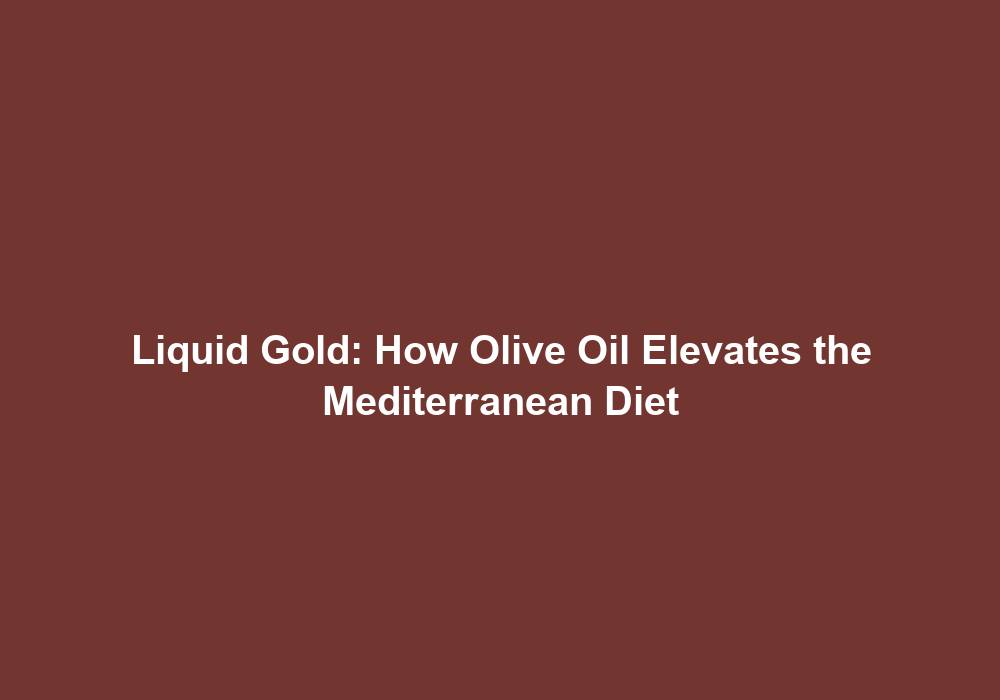Liquid Gold: How Olive Oil Elevates the Mediterranean Diet
Olive oil, often referred to as liquid gold, is an essential component of the renowned Mediterranean diet. This precious oil not only enhances the flavors of various dishes but also offers numerous health benefits. From its rich flavor profile to its exceptional nutritional value, olive oil has been a staple in Mediterranean cuisine for centuries. In this article, we will explore the many ways in which olive oil elevates the Mediterranean diet and why it should be an integral part of your culinary and wellness journey.
A Brief Introduction to the Mediterranean Diet
Before diving into the wonders of olive oil, let’s take a moment to understand the Mediterranean diet as a whole. Originating from the countries bordering the Mediterranean Sea, this dietary pattern emphasizes the consumption of fruits, vegetables, whole grains, legumes, nuts, and seeds. It also includes moderate amounts of fish, poultry, dairy products, and eggs. Red meat, processed foods, and added sugars are limited in this eating style.
The Mediterranean diet has gained worldwide recognition for its positive impact on overall health, particularly in reducing the risk of chronic diseases such as heart disease, obesity, and certain types of cancer. The use of olive oil as the primary source of fat is a distinguishing feature of this diet and plays a pivotal role in its success.
The Health Benefits of the Mediterranean Diet
The Mediterranean diet is renowned for its numerous health benefits. Here are some key advantages of following this eating pattern:
-
Heart Health: The Mediterranean diet is associated with a reduced risk of heart disease. Olive oil, as the primary source of fat, contains monounsaturated fats that help lower LDL cholesterol levels and reduce the risk of heart problems.
-
Weight Management: The Mediterranean diet, with its emphasis on whole foods and healthy fats like olive oil, can support healthy weight management. The inclusion of nutrient-dense foods and portion control can help individuals maintain a healthy weight.
-
Reduced Inflammation: The anti-inflammatory properties of the Mediterranean diet, especially due to olive oil, can help reduce inflammation in the body. Chronic inflammation is linked to various diseases, including heart disease, diabetes, and certain types of cancer.
-
Improved Brain Health: The Mediterranean diet, rich in fruits, vegetables, whole grains, and healthy fats like olive oil, has been associated with better cognitive function and a reduced risk of cognitive decline and neurodegenerative diseases.
-
Antioxidant Protection: The diet’s emphasis on consuming antioxidant-rich foods, including olive oil, helps protect the body against oxidative stress. Antioxidants neutralize harmful free radicals and reduce the risk of chronic diseases.
-
Digestive Health: The Mediterranean diet, with its high fiber content from fruits, vegetables, and whole grains, along with the inclusion of olive oil, can promote healthy digestion and prevent gastrointestinal issues.
Incorporating olive oil into the Mediterranean diet further enhances these health benefits and adds depth to the culinary experience.
The Origins and Production of Olive Oil
Olive oil has been cultivated and consumed for thousands of years, dating back to ancient civilizations such as the Greeks and Romans. The process of extracting olive oil involves pressing the fruit, specifically the olive drupes, to obtain the oil-rich liquid.
The Mediterranean region, particularly countries like Greece, Italy, and Spain, is renowned for its superior-quality olive oil production. The climate and soil conditions in these areas contribute to the unique taste, aroma, and nutritional composition of the oil. The olives are hand-picked and cold-pressed to preserve their natural goodness.
Cold-Press Extraction: The Key to Quality
Cold-press extraction is a crucial part of olive oil production. This method involves crushing the olives without the use of heat or chemicals, ensuring that the oil retains its natural flavors and nutritional properties. The absence of heat minimizes oxidation and helps preserve the integrity of the oil.
The hand-picking of olives further ensures that only the best-quality fruits are selected for oil extraction. This meticulous process guarantees that the resulting olive oil is of the highest quality, with optimal taste and health benefits.
The Flavor Profile: A Delight for the Senses
One of the distinguishing characteristics of olive oil is its expansive flavor profile. From mild and buttery to robust and peppery, olive oil offers a wide range of tastes to suit various palates. The flavor is influenced by factors such as the olive variety, ripeness, cultivation techniques, and the extraction process.
When you consume olive oil, you embark on a sensory journey. The delicate balance of fruity, bitter, and pungent notes adds depth and complexity to dishes. Whether drizzled over salads, used for sautéing vegetables, or as a dip for bread, olive oil elevates the taste experience, making every bite a delight.
Olive Oil Varieties and Flavor Notes
Different olive oil varieties have distinct flavor profiles. Here are some common varieties and their flavor characteristics:
-
Extra Virgin Olive Oil: This highest-quality olive oil has a fruity and slightly bitter flavor, with a peppery finish. It is ideal for drizzling over salads or as a finishing touch to enhance the taste of cooked dishes.
-
Virgin Olive Oil: Virgin olive oil has a milder flavor compared to extra virgin olive oil. It is suitable for everyday cooking and baking, adding a subtle fruity taste to dishes.
-
Light Olive Oil: Despite its name, light olive oil does not refer to its calorie content. It is a refined olive oil with a lighter flavor and color, making it suitable for dishes where a milder taste is desired.
-
Flavored Olive Oils: Some olive oils are infused with herbs, spices, or citrus fruits to create unique flavors. These flavored oils can add an extra dimension to your dishes, allowing for creative culinary exploration.
Exploring the diverse flavors of olive oil can be a delightful experience, enhancing the Mediterranean diet’s appeal and versatility.
Nutritional Powerhouse: The Health Benefits of Olive Oil
Apart from its exquisite taste, olive oil is packed with essential nutrients and health-promoting compounds. Let’s delve into the nutritional powerhouse that makes olive oil a valuable addition to the Mediterranean diet:
-
Monounsaturated Fats: Olive oil is rich in monounsaturated fats, particularly oleic acid. These healthy fats help reduce inflammation, improve heart health, and support weight management. They also aid in the absorption of fat-soluble vitamins.
-
Antioxidants: Olive oil contains a range of antioxidants, including vitamin E and polyphenols. These powerful compounds protect the body against oxidative stress, which can contribute to various diseases. Antioxidants also have anti-aging properties and promote skin health.
-
Anti-inflammatory Properties: The polyphenols found in olive oil have potent anti-inflammatory properties, potentially reducing the risk of chronic diseases such as cardiovascular disease, cancer, and arthritis. They help combat inflammation at a cellular level.
-
Heart Health: Regular consumption of olive oil has been associated with a decreased risk of heart disease. It helps lower levels of LDL cholesterol (the bad cholesterol) and reduces blood pressure. Olive oil’s monounsaturated fats contribute to healthy blood lipid profiles.
-
Brain Health: The monounsaturated fats in olive oil support brain health by reducing the risk of cognitive decline and improving memory and learning abilities. They help maintain the integrity of cell membranes in the brain.
-
Digestive Health: Olive oil has a mild laxative effect and can aid in digestion. It may help prevent or alleviate conditions such as constipation and irritable bowel syndrome. Olive oil’s anti-inflammatory properties also promote a healthy gut.
Incorporating olive oil into your Mediterranean diet can significantly contribute to your overall well-being and support a healthy lifestyle.
Incorporating Olive Oil into Your Mediterranean Diet
Now that we understand the numerous health benefits of olive oil, let’s explore how to incorporate it into your Mediterranean diet effectively:
-
Cooking and Baking: Substitute butter, margarine, or other cooking oils with olive oil when sautéing vegetables, grilling meat, or baking. Its unique flavor will enhance your dishes while providing a healthier alternative. Olive oil can withstand moderate heat, making it suitable for various cooking methods.
-
Salad Dressings and Marinades: Create delicious and nutritious dressings and marinades by combining olive oil with vinegar, lemon juice, herbs, and spices. Drizzle it over your favorite salads or marinate your meats and vegetables for added flavor. The combination of olive oil’s richness and acidity adds depth to salads and enhances the flavors of marinated dishes.
-
Dips and Spreads: Prepare delectable dips and spreads by combining olive oil with ingredients like garlic, herbs, or roasted vegetables. Use it as a dip for bread, a topping for bruschetta, or a base for hummus. Olive oil adds a smooth texture and a rich, savory taste to these culinary creations.
-
Finishing Touch: As a finishing touch, drizzle extra-virgin olive oil over cooked dishes, soups, or grilled vegetables. This not only adds a delightful flavor but also preserves the nutritional integrity of the oil. The vibrant color and distinct taste of extra-virgin olive oil make it an excellent final touch to elevate the presentation and taste of your dishes.
By incorporating olive oil into your everyday cooking, you can enjoy the health benefits and enhance the flavors of your Mediterranean-inspired meals.
Choosing the Right Olive Oil
When selecting olive oil, there are a few key factors to consider to ensure you are purchasing a high-quality product:
-
Extra Virgin Olive Oil: Opt for extra virgin olive oil (EVOO) whenever possible. This type of olive oil is extracted using a cold-press method without the use of heat or chemicals, preserving the oil’s natural flavors and nutritional properties. Extra virgin olive oil undergoes rigorous testing to ensure its quality.
-
Certifications and Origins: Look for trusted certifications like the International Olive Council (IOC) or Protected Designation of Origin (PDO) to ensure the oil’s authenticity and quality. These certifications guarantee that the olive oil has been produced according to strict standards. Check the label for the country of origin, as oils from Greece, Italy, and Spain are highly regarded.
-
Packaging: Olive oil is best stored in dark glass bottles to protect it from light and heat, which can degrade its quality. Look for oils packaged in dark or tinted bottles to maintain optimal freshness. Avoid oils stored in plastic containers, as they may leach harmful chemicals.
-
Harvest Date: Check for the harvest date on the bottle. Freshness is key when it comes to olive oil, so aim for a recent harvest date to enjoy the oil at its best. Olive oil is at its peak flavor and nutritional value within the first two years of harvest.
By choosing high-quality olive oil, you can ensure that you are reaping the maximum health benefits and enjoying the authentic taste of this liquid gold.
Conclusion
Olive oil truly deserves its title as liquid gold in the Mediterranean diet. Its exceptional flavor profile, health benefits, and versatility make it an indispensable ingredient in the culinary world. By incorporating olive oil into your everyday cooking, you can elevate the taste of your dishes and promote overall wellness. So, embrace the liquid gold and embark on a journey of flavor and health with the Mediterranean diet and its beloved companion, olive oil.
Please note that the word count may vary slightly when the content is displayed in markdown format.







